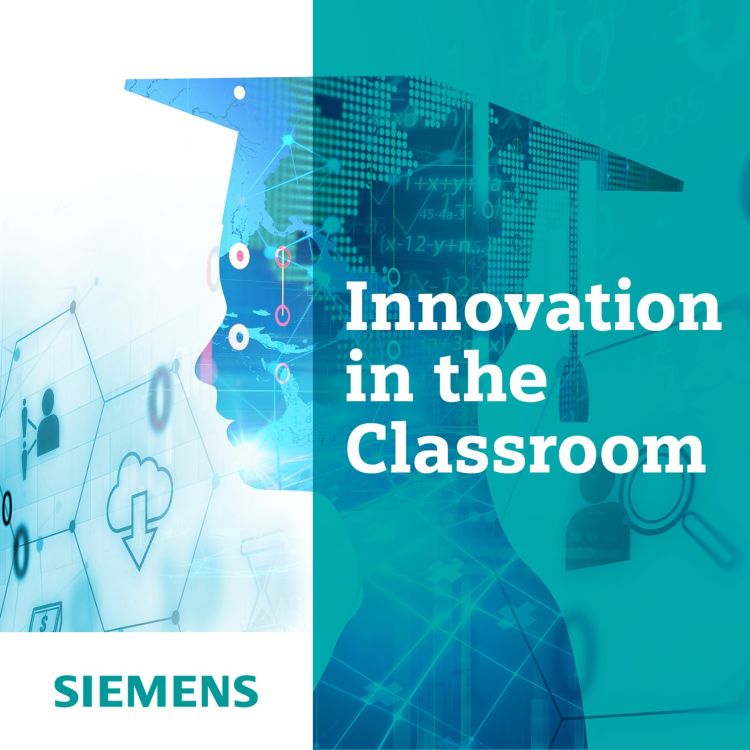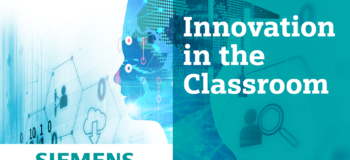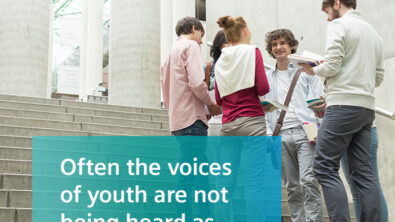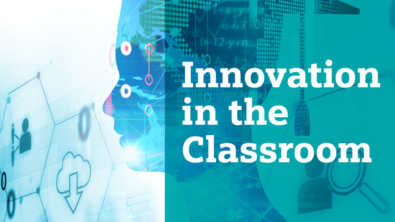Podcast Transcript: Interns Inspiring Innovation

When it comes to preparing to join the workforce, spending time as an intern is one of the best ways to build you network and apply your studies to real-world situations. Today, engineering interns can get ahead by familiarizing themselves with industry-standard software that they will use extensively throughout their career.
On this episode of Innovation in the Classroom, I interview Susanne Barnsteiner, an industrial engineering intern at AGCO and graduate student at the University of Applied Sciences in Kempten, Germany. Barnsteiner has reaped the benefits of learning software like Siemens Plant Simulation in school. Her software knowledge has allowed her to impact her company with large scale projects as an intern.
Check out the podcast by clicking the link here and read the full transcript below. Click here to follow Innovation in the Classroom Podcast.
Podcast Transcript
Christina DePinto: Hi everyone. Welcome back to the Innovation In The Classroom podcast. My name is Christina Dipinto, and I’m currently a Marketing and Communications intern with the Global Academic Partner Program. I’m joined today by Susanne Barnsteiner an industrial engineering intern and graduate student. Thank you so much for joining us today, Susanne. Why don’t you go ahead and start by telling us a little bit about yourself and your career so far?
Susanne Barnsteiner: Hello, everyone. I’m Susanne. I’m currently a graduate student at the University of Applied Sciences in Kempten, Germany. I’m studying Industrial Engineering and, at the same time, I’m working as an intern at AGCO, especially at Fendt, which is one of the brands of AGCO. And so, this is some kind of dual educational program, and that’s what I’m currently doing.
Christina DePinto: So, you’re definitely busy.
Susanne Barnsteiner: Yes, I am. You’re right.
Christina DePinto: So, I guess my first question is, why did you choose Industrial Engineering? What was interesting about it to you?
Susanne Barnsteiner: Well, in school, my favorite subjects were Math, Physics, and Economics, but also languages like English and French. So, I was searching for a study that combines all of them. And, as an industrial engineer, the spectrum of possibilities in this field is almost infinite. So, on the one hand, you can work in large international companies, as well as in small and local hidden champions. And, on the other hand, there are multiple departments you can work in – so Marketing, Sales, Logistics, Controlling, Planning, and so on. I also really like the Bavarian model of study with in-depth practice. So, what I already mentioned, the dual study, which means I am a paid employee at a company during my studies, and after each semester, I go to work to apply my theoretical knowledge in my job and gain some experience for my future career. So, when I received the offer from AGCO for study with in-depth practice, as an industrial engineer, there was no doubt about my decision.
Christina DePinto: That’s amazing. Yeah. Talking more about that dual educational opportunity with your internship, what’s a day in the life at your internship like?
Susanne Barnsteiner: At the moment, I’m writing my master’s thesis at the Fendt production site in Marktoberdorf in the Production Planning Department. So, I’m carrying out my own project where I’m testing and evaluating software for virtual reality workplace design. And additionally, I’m supporting my colleagues at the planning department in their daily business, but also in their current project. So, as you can imagine, a day in the life is very diverse this way because every day, I learn how to lead a project, how to work in a team, or how to find good solutions regarding a planning task. And on top of that, I get the chance to improve my communication skills and to extend my knowledge of new technologies. So, that’s really diverse and really interesting for me.
Christina DePinto: That’s awesome. Your thesis sounds so interesting. I’m interested to learn more about that. How did you get kind of started with VR and where did that inspiration come from?
Susanne Barnsteiner: A friend at Marktoberdorf in the Planning Department, we are searching for and looking for new innovational planning tools and there are a lot of opportunities in this topic. But we were just interested in the virtual reality planning tool, because we have never had something like this before, so it was kind of a pilot project. I am honored to be the first person to try and evaluate the software.
Christina DePinto: That’s amazing. Were there any other projects that you’ve been working on, either in school or in your internship that have stood out to you in particular, where you felt like you can make a big impact?
Susanne Barnsteiner: About two years ago, I was writing my bachelor thesis. At that time, I was working in the Manufacturing Component Area here at Fendt, and the challenge was to improve the material flow of a project and to enlarge the capacity for the increasing number of parts we had to produce. And so, back then, the first thing I did was to develop concepts for a new process together with a team of manufacturing engineers. And then, we chose one concept and I evaluated it, and we evaluated it regarding cycle time, throughput, and inventories by using Siemens’ Plant Simulation. And what makes this one of my favorite projects is that I had the chance to learn new software on the one hand, and on the other hand, I could actively contribute to the improvement of a process. So, I feel like this is really motivating for me to improve other people’s daily work.
Christina DePinto: Wow, that’s so cool that you could really impact your company like that. And how did that feel to get to take on such a large project as an intern?
Susanne Barnsteiner: At first, it is a bit overwhelming, to be honest. Because transferring the theoretical knowledge you have onto the practical challenge is not that easy at first, but I feel like with a good team spirit and teamwork, and with everybody helping you and supporting you, I learned how to do a project. And I think we got some good results, and I was really proud of my Bachelor thesis in the end.
Christina DePinto: Talking about that software proficiency and applying that theoretical knowledge. Did you have to learn software for your internship or did you go in prepared, knowing a few different types of software that you used throughout your work?
Susanne Barnsteiner: As my university is the University of Applied Sciences, the lectures and software you learn are tailored to the needs of regional companies. This way the education is broadly diversified, but at the same time is assured that you are learning useful skills the companies are searching for. So, especially in terms of software proficiency, I feel like I was really well prepared because I learned how to use and program standard tools like Microsoft Excel, or Microsoft Project. But I also gained the first experience with expert tools like Siemens Plant Simulation, while working on a project in groups of five, at the University. This experience is definitely going to be the cornerstone for future projects in my career, and I think this is a really good education for the first experience at work and in practical projects.
Christina DePinto: I’m glad that you had that experience with the software prior to your internship. I’m sure it was hard to adjust to that when you were working from home throughout 2020 and the pandemic that has kind of taken over the year. Can you talk about how your job has changed since the pandemic or how it was transitioning to a more remote work style?
Susanne Barnsteiner: The first thing that really changed for me or changed my plans was that I was doing a Business English course in Australia in March for five weeks and I had to interrupt it and I couldn’t go traveling afterward, because of COVID, and then I came back. Actually, I was glad I could start working right away, but it was definitely different than before because it was, at first, we had the lockdown. So, it was 100% home office for maybe four or five weeks, because the company couldn’t run its business anymore because the suppliers ran out of material, so that was a lot of home office in April. And then, everything was kind of back to normal for a few months, so almost no home office. Now we have a second wave, so we have a lockdown again, this time is called lockdown night. So, stores are open but restaurants, sports studios, and cinemas are closed and we have the duty to wear masks and to keep the social distance at work but also in public areas. So, at the moment, my department is divided into two alternating groups, so we work in home office 50% of the time. And for me, it’s not that bad, actually, because now I have the time at home to write my Master’s thesis and I can concentrate on that. And every second day when I’m in the office, I can use that time for teamwork and for project work. So, for me, it’s actually not too bad.
Christina DePinto: It helps with the balance of being a student and also an intern at the same time, I would guess.
Susanne Barnsteiner: Yeah, exactly.
Christina DePinto: So, how has your experience with Siemens software helped you with other projects? Are you working on anything interesting right now that you wanted to share?
Susanne Barnsteiner: At the moment, I’m not working with Siemens Plant Simulation, but I had some lectures in a simulation laboratory at university, and I also used the software practically in a university project and at work two years ago. So, I think I would say for me personally, it’s a very good example of how to transfer theoretical knowledge into practical experience. And I think this keeps me really motivated and this encourages me to always try and be open to learning new things. So, I think I’ll definitely use the software some time again, but it always depends on the current project we have to manage in the department.
Christina DePinto: Yeah, that makes total sense, and that’s cool that you can work with so many different software’s and really get the full scale and get to see the full impact of your work. So, that’s really cool. What do you hope to do with your career? Kind of broadening our conversation, we talked about why you chose industrial engineering, but what do you hope to do in the future? What do your next few years look like?
Susanne Barnsteiner: Well, first of all, I’m proud to work in a male-dominated industry as a female engineer. And also, due to my studies with in-depth practice, I can benefit from several years of practical experience, even though I’m only 22 years old. So, in the next few years, I’d like to further develop my skills and extend my knowledge regarding new technologies. So, I can drive innovation and contribute to the growth and corporate success. Also, I’m looking forward to seizing the numerous opportunities that AGCO and Fendt have to offer. I hope I can make an impact on the industry and contribute to a good working environment.
Christina DePinto: That’s amazing. You talked about working in a male-dominated field. Do you have any advice for future engineers, and maybe, in particular, female engineers who want to follow in your footsteps and do something similar to you?
Susanne Barnsteiner: Well, first of all, as a dual student, I can say, gain as much practical experience as possible during your studies, build a professional network for your future career, and also take every chance to study abroad and improve your language skills, I can definitely recommend that. And to get to know other cultures as well. Also, make time for social commitment and follow a sustainable lifestyle. I think this is really important for work-life balance. But no matter what you do, definitely have no fear of making mistakes because they only make you stronger, it helps you to always be open and curious about new things. Last but not least, you shouldn’t forget to enjoy life, because this is what we’re here for. No matter if in private life or at work you should definitely still have fun.
Christina DePinto: Yeah, that’s such good advice, I think a lot of people could benefit from that. You talked about your professional network and building that. Was that at work, or how did you go about finding a support system within the industry?
Susanne Barnsteiner: Well, I feel like as AGCO is a quite large company, with a lot of departments, you definitely get to know a lot of people during an internship. For me, I got to experience two different departments, the Manufacturing Component area, and the Production Planning department. So, this really helped me to get two different angles, the manufacturing angle and the assembly angle and planning angle. This way, you really get to know a lot of people and you can build a network, and you can also always know who’s the person in charge if you have a special request, and especially as an intern, usually you have a lot of requests in the beginning, so yeah. And I think it’s a really good opportunity in the dual system, that you have that time at work and you’re an employee at a company, so you can build a network other students who just study at university don’t.
Christina DePinto: Definitely. And as a fellow intern, I can definitely relate to asking a lot of questions and having a lot of special requests at the beginning. So, having that network is really important to be able to draw upon. Well, those are all my questions for you. It was amazing talking to you Susanne, thank you so much for sitting down on the Innovation in The Classroom podcast with me. To subscribe to the podcast, click below. Thanks so much.


